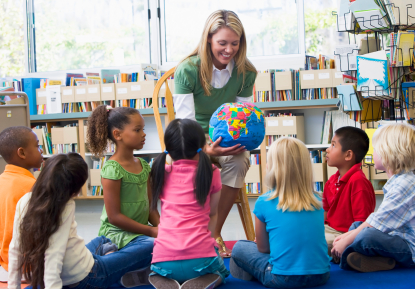When I conduct workshops for parents and educators and ask them, “Do you want kids to have a quality educational experience?” they all say, “Yes.” With enthusiasm. I have yet to have a parent or teacher say to me, “No. We’re looking for a mediocre experience. Maybe even a poor one. Quality is seriously over-rated.” No. There is universal agreement that we want our kids to have the best educational experience we can offer them. The problem comes when we start to define exactly what we mean by “a quality educational experience.” At that point, differences begin to surface. We quickly discover that there are different ideas about what we want for our kids when it comes to their education and the purpose of education.
Let me begin by asking you to consider the following question: “What is the purpose of education in the 21st century?” In this article, I’ll initiate the conversation by giving a historical perspective and suggesting where we might want to go from here. Other articles, some written by me and some by my colleagues at Funderstanding, will continue the conversation. I encourage you to share your ideas. Together, we can have a spirited and enlightening dialogue.

Education 1.0
Even before recorded history, adults have educated the next generation. While there may not have been a “Student of the Month,” SATs, or class valedictorian, even the most primitive people innately understood the necessity of sharing essential information with their offspring. What drove early people was the need to survive – literally. They passed on skills and knowledge to their children so the individual would survive and the species thrive. With danger lurking around every corner (or, perhaps more accurately, behind every rock or tree), a quality education was essential. It may not have been formalized, but it was as crucial as it is today.
Education 1.0 – like life itself – was primarily about survival. Life was so tenuous in the earliest days of humanity, that there was little thought about improving your lot, social mobility, or self-actualization. Living to fight (or farm or hunt) another day was equivalent to making AYP (Adequate Yearly Progress). When standards were met, you survived. It was truly that simple. The goal of education was clear and unambiguous.
Education 2.0
Somewhere along the line, education became formalized and was entrusted to professionals. The focus moved from survival of the individual to the accumulation of knowledge and skills, as well as developing literacy and the ability to effectively manipulate numbers. The family continued to play an important role in the education of their children, but at some point education was outsourced to those with academic expertise. Whereas Education 1.0 identified an educated person as one who was able to survive, Education 2.0 brought the notion that education is synonymous with academics.
The most significant shift that distinguishes Education 2.0 from Education 1.0 is the emphasis on society. As a teacher, instead of me being primarily concerned about teaching you what you need to know so you can survive, in Education 2.0 my focus is to help you develop skills so we can survive and flourish. In “Good Citizenship: The Purpose of Education”. Eleanor Roosevelt urges her readers to go beyond the conventional definition of education as “the acquisition of knowledge, the reading of books, and the learning of facts” and advances the idea that the purpose of education is to produce good citizens. The focal point in Education 2.0 has gradually shifted from the individual to the group.
In 2001, PBS aired a four-part documentary entitled “School: The Story of American Public Education” which suggests that the following have been goals of our public education system:
- To prepare children for citizenship
- To cultivate a skilled workforce
- To teach cultural literacy
- To prepare students for college
- To help students become critical thinkers
- To help students compete in a global marketplace
Consider that list. The emphasis is on serving society, either through work or further education. The emphasis is on the “commercial” benefits of a good education (“to help students compete in a global marketplace.”) The goal of education is to help society flourish.
If you look up “Education” in Wikipedia, you’ll read, “education is the process by which society deliberately transmits its accumulated knowledge, skills, and values from one generation to another.” Notice that even in today’s digital world, education is seen as the transmission of knowledge and values that perpetuate the existing society.
While each of the goals pursued in Education 2.0 has merit, something seems missing.
Education 3.0
We have entered a new era. The earliest humans were rightly preoccupied by survival and educated their children with this is mind. Subsequent generations conceptualized education as a means to support the existing society. While the focus shifted from the individual to the social group, both Education 1.0 and Education 2.0 are rooted in the drive to survive.
Even given today’s difficult economic climate, most people are not concerned with literal survival. We have legitimate concerns, to be sure. But the vast majority of us fret over having fewer vacations, cutting down on luxury items, and scaling back our lifestyle to a level that our grandparents would envy. Certainly there are far too many people who are struggling more than I have described here, but the overwhelming majority of people today are considerably more comfortable than their ancestors, at least from a material perspective.
To be relevant, education must match the needs of the people. Education 1.0 was relevant because it equipped children with the knowledge and skills needed to live another day. Education 2.0 was relevant for a time because it helped us build elaborate and successful societies.
Today’s world calls for an expanded model of education. With so many people –thankfully – beyond the survival level, if it is to be relevant, education needs to go beyond individual or societal survival. It’s time to expand our goals. Let me propose the following additional goals for education in the 21st century:
- To help students develop their individual talents and abilities
- To help students reach their potential
- To help students develop into happy, responsible members of their community
- To help students understand and appreciate the interconnectedness of all people
- To help students respect the environment
- To help students create and live a meaningful life
Conclusion
Education continuously evolves. Subsequent stages don’t replace previous ones. Rather, they incorporate and build upon them. Humans have moved beyond a simple quest for survival – both on a personal level and societal level – to a quest for fulfillment. The best educational practices are those that support all students as they strive to create satisfying, purposeful, fulfilling lives. It’s time to introduce Education 3.0 and make the goals I have identified an integral part of our system of education.
These are my thoughts. What are yours?
